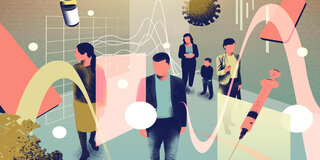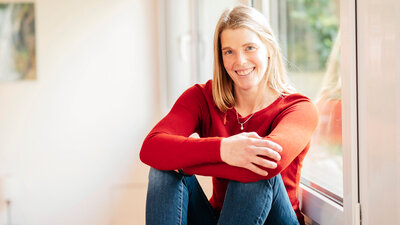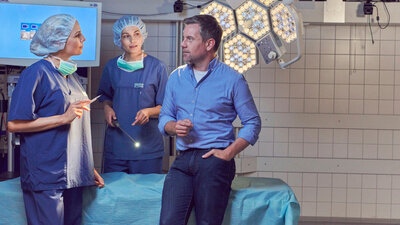How to avoid Covid 2.0 - what we have learned so far from the pandemic

© W&B/Mario Wagner
We will have to forgive one another a lot, former German Federal Health Minister Jens Spahn said in April 2021. Later, he specified that statement. He had meant that we should all be willing to forgive where we had been wrong. And that it was better to learn from these mistakes. A nice thought. But right in the middle of the fourth wave, it does not look as if we have learned from our mistakes.
As early as autumn 2021, the number of Covid cases exploded again, and many intensive care units were overcrowded once more. The fourth wave hit Germany even harder than previous ones. Will we draw conclusions from our failings this time? What has to happen so that we can leave Corona finally behind us? And how can we prepare for future pandemics? The experts consulted by the Apotheken Umschau have a few ideas indeed.
Shadows and Light
Science. Consulting for politicians is not always successful. Some ignorance remains. But without the successes of scientific research, the pandemic will not be overcome.
Corona has made a few research superstars. Two years ago, the researchers would not have expected that. People who were once known only in expert circles have become celebrities. And hate figures as well, receiving everything from name-calling to death threats from anti-vaxxers and Corona deniers. This dichotomy is based on a lot of misunderstandings. But more on that later.
Filling the Gap in Knowledge
Let us return to the beginning of the current pandemic, to the first reports about a new virus in China, to the first lock-down. Almost everything was unknown back then: Can you get infected by touching a doorknob touched previously by an infected person if you subsequently touch your face? Do masks really stop the virus? Who is threatened by extraordinarily heavy symptoms? And, most importantly: There was no medication, and certainly no vaccine.
In such a situation, science has to play a vital role. Who else could close the gaps in our knowledge, develop therapies, explain the background to political decision-makers? Without science, fighting a pandemic is unthinkable. Scientists as advisors to political decision-makers? Certainly not a new thing.
It is one of the main services offered by the German National Academy of Sciences Leopoldina, a body consisting of 1,600 leading researchers. Advisory councils of experts produce evaluations for political decision-makers. Experts participate in hearings organised by parliamentary sub-committees. However, the public had hardly taken notice. That has changed since Covid-19.
21 councils of experts have been called on by individual federal states or national ministries, according to researchers at Munich University. It is quite possible, they say, that their overview might be incomplete. And no chat show on German television can do without these experts nowadays.
How to Keep the Tasks Separate
Has this new presence been good for science? At least for a section of the public, science has lost reputation. Critics use terms like expertocracy to castigate the perceived heavy involvement of researchers in political decision-making. They also blame scientists for school closures and restrictions to the freedom of movement during the pandemic.
There is, of course, a strict division of tasks: In short – scientists advise, politicians take the decisions. Or, to quote Leopoldina president Professor Gerold Haug: ‘We deliver scientifically substantiated insights on the current state of knowledge and identify possible courses of action. To take decisions is the task for democratically legitimated politicians, that is the federal government and the federal states’ governments.’
But this separation of tasks does not always work to perfection. ‘On the one hand, scientists almost unnoticed by the public before now – in a stress situation – make more demands than they should as scientists’, says Professor Urban Wiesing, head of the Institute for Ethics and the History of Medicine at Tübingen University. On the other hand, he adds, policy-makers have an interest to take unpopular decisions by justifying them scientifically.
‘It’s a fine line’, says Professor Stefanie Molthagen-Schnöring, an expert for science communication at the University of Applied Sciences Berlin. She recommends that science ought to concentrate on substantiations based on studies leading to successful measures against the pandemic.
Researchers should, however, know their limitations. Virologists are the experts on test procedures for school children. But judging the consequences of school and kindergarten closures should be left to social scientists, psychologists and educators. ‘I would hope for advisory panels where that is taken into account more signifivantly’, adds Molthagen-Schnöring.
How To Deal With Expectations
That is, of course, not the only problem in the difficult relationship between scientists, politicians, and the general public. ‘The people want security from science’, says Molthagen-Schnöring. But that is not how the process of scientific understanding works: Research has to be ready to throw old knowledge over board when new insights come to the fore.
Many people find that difficult. Sometimes, politicians also lack understanding – and thus undermine the public’s trust in science. Some politicians blamed an alleged disunity amongst researchers for the fact that measures against the fourth Corona wave came so late.
In terms of research results, there is a lot of light, but also some shadows. It was truly sensational that a vaccine was on the market in less than a year. Some medications also give us hope. But there are a lot of questions surrounding Corona where science can offer less than satisfying answers. We still do not have an estimate of unknown cases. And we also don’t know where when indoors we are most likely to get infected. Is the risk highest in restaurants and bars, on public transport, at work, or at home?
Well over 5,000 research papers have by now been published on the Corona virus, according to the academic journal Science. It is obvious that not all of them can indicate a break-through. But the really important stuff is also very urgent. The Danish researcher Serge Horbach claims that the urgency sometimes diminishes the quality.
Forward-Looking Research
Many studies are published before they are scrutinised independently. That accelerates research, but it has its downsides. For example, the first study on the anti-Covid medication Remdesivir was followed by a number of studies showing that it does have rather limited effect. These follow-up studies might have been unnecessary if the first one had been more thorough.
So, what can we learn from the current pandemic for future ones? Most importantly: Science should be more forward-looking in its research, developing medication to deal with other types of viruses, so that we are better prepared for new pandemics. Because they are certain to come.
Let‘s Classify, Not Frighten
Media. Uncritical and one-sided? How justified is the critique of the media? And what needs to be improved?
Corona has a permanent presence on all channels. Almost as old as the pandemic itself is the criticism of the media coverage of the crisis. Have journalists spread panic instead of providing balanced information? Did we pay too little attention to critical voices?
Let Us Stay Balanced
Like pollical decision-makers and researchers, the media were also confronted by a totally new and quickly escalating situation. Also, many media outlets had, in recent years, reduced the number of science journalists in their ranks to cut costs. Experienced journalists who could explain the pandemic were rare.
However, several studies have been conducted to analyse the role of the media during the Corona crisis. A study by the University of Mainz shows that the trust the public places in journalism had risen by the end of 2020, compared to previous years. Good news for journalists, among all that ‘mendacious press’ chanting of the Corona deniers. Nevertheless, it is also true that some people relied on social media rather than newspapers to stay up to date.
News portals like the Russian-financed Russia Today (RT) Deutschland also became increasingly popular. Strangely enough, when intensive care units were filling up in Germany during the fourth wave, RT Deutschland reported on the side effects of Covid vaccinations. In Russia itself, however, RT took a positive view on vaccinations.
But back to more traditional media outlets: Criticism about the Corona coverage also comes from within journalism’s own ranks. Andreas Rosenfelder, culture editor of the daily paper Welt, has claimed that during the crisis, German journalism has built a wagon fort around the Federal Chancellery. ‘They make it their task to defend the strategy of the government and guide their criticism towards “unreasonable” citizens’, he wrote. Media journalist Imre Grimm says he observed the enactment of a drama with virologists cast either as ogres or as saviours. Especially the tabloid Bild, he wrote, conducted ‘aggressive campaign journalism’.
Besides such critical individual opinions, a study at the behest of the Rudolf Augstein Foundation provided a comprehensive overview of the quality of coverage. The researchers analysed more than 5,000 contributions by leading media outlets – including Tagesschau and RTL Aktuell evening news and Bild – between January 2020 and April 2021.
On the whole, the study concluded, the coverage was objective. The measures to fight the pandemic were seen by most journalists as appropriate or even not sufficiently far-reaching. Only a minority argued that they were going too far. In terms of variety, the focus had been on politicians first, followed by doctors and researchers. Patients and critics were underrepresented, however, the study concluded critically.
Showing Up Solutions To The Crisis
For a long time, the virologist Christian Drosten was dominant as the ‘pandemic interpreter’. He was then supplanted by the Social Democratic politician Karl Lauterbach, now Federal Minister for Health. According to the researchers, the consequences of the measures against Covid were under-reported.
From autumn 2020 onwards, the economic consequences of the lock-down played a very minor role, as did the social consequences and the educational ones. Negative health effects like the drastic increase in psychological problems were hardly discussed at all. That was a mistake.
And that leads us to an important message for all media outlets to pursue a holistic approach in future crises in order not to lose the trust of the public. Another idea for better journalism during a crisis is discussed in a study by the Otto Brenner Foundation: In times when people get the feeling of living in a permanent crisis, the media ought to outline constructive approaches.
They should not hunt for the most drastic headline. They should discuss possible solutions. Whether that idea is realistic in our fast and furious news business: We are eager to find out the answer to that question.






